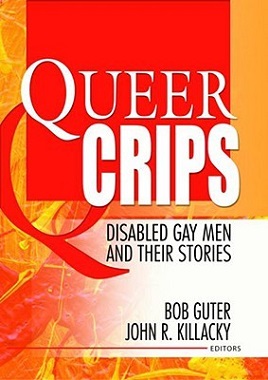Queer Crips
Queer Crips is a term that encompasses individuals who identify within both the LGBTQ+ (Lesbian, Gay, Bisexual, Transgender, Queer, and others) community and the disability community. This intersectional identity highlights the unique experiences, challenges, and perspectives of people living at the crossroads of queer and disabled identities. The term "Crip" is a reclamation of the historically derogatory word "cripple," repurposed to signify empowerment and solidarity within the disability community. Similarly, "Queer" is reclaimed by some LGBTQ+ individuals as a term of empowerment and inclusivity.
History and Significance[edit | edit source]
The history of the Queer Crips movement is intertwined with the broader histories of the disability rights and LGBTQ+ rights movements. Both movements have sought recognition, rights, and respect from society, often facing similar challenges such as discrimination, marginalization, and the fight for visibility. The intersection of these identities brings to light the compounded difficulties faced by individuals who are both queer and disabled, but also highlights the resilience, diversity, and strength found within this community.
Challenges[edit | edit source]
Queer Crips face a unique set of challenges that stem from societal attitudes towards both their sexual orientation or gender identity and their disability. These challenges include, but are not limited to, accessibility issues within LGBTQ+ spaces, lack of representation in both LGBTQ+ and disability communities, and healthcare disparities. Additionally, the intersection of these identities can lead to compounded discrimination and marginalization, making it difficult for Queer Crips to find spaces where they feel fully accepted and understood.
Advocacy and Community[edit | edit source]
Advocacy for Queer Crips involves addressing both ableism and LGBTQ+ phobia, advocating for accessible spaces within LGBTQ+ communities, and promoting visibility and representation. Organizations and groups specific to Queer Crips have emerged, providing support, resources, and community for individuals navigating these intersecting identities. These groups work towards fostering an inclusive environment where all aspects of an individual's identity are acknowledged and celebrated.
Representation[edit | edit source]
Representation is crucial for the Queer Crips community, as it helps to challenge stereotypes and increase visibility. This includes representation in media, literature, politics, and within both the LGBTQ+ and disability rights movements. Efforts to increase representation involve advocating for inclusive practices in all areas of society, from healthcare to entertainment.
Conclusion[edit | edit source]
Queer Crips represent a vibrant and resilient community that navigates the complexities of living with intersecting marginalized identities. By reclaiming derogatory terms and advocating for their rights, Queer Crips contribute to the broader conversations around diversity, inclusion, and intersectionality. As society continues to evolve, the recognition and support of Queer Crips will be essential in building a more inclusive world for everyone.
Search WikiMD
Ad.Tired of being Overweight? Try W8MD's physician weight loss program.
Semaglutide (Ozempic / Wegovy and Tirzepatide (Mounjaro / Zepbound) available.
Advertise on WikiMD
|
WikiMD's Wellness Encyclopedia |
| Let Food Be Thy Medicine Medicine Thy Food - Hippocrates |
Translate this page: - East Asian
中文,
日本,
한국어,
South Asian
हिन्दी,
தமிழ்,
తెలుగు,
Urdu,
ಕನ್ನಡ,
Southeast Asian
Indonesian,
Vietnamese,
Thai,
မြန်မာဘာသာ,
বাংলা
European
español,
Deutsch,
français,
Greek,
português do Brasil,
polski,
română,
русский,
Nederlands,
norsk,
svenska,
suomi,
Italian
Middle Eastern & African
عربى,
Turkish,
Persian,
Hebrew,
Afrikaans,
isiZulu,
Kiswahili,
Other
Bulgarian,
Hungarian,
Czech,
Swedish,
മലയാളം,
मराठी,
ਪੰਜਾਬੀ,
ગુજરાતી,
Portuguese,
Ukrainian
Medical Disclaimer: WikiMD is not a substitute for professional medical advice. The information on WikiMD is provided as an information resource only, may be incorrect, outdated or misleading, and is not to be used or relied on for any diagnostic or treatment purposes. Please consult your health care provider before making any healthcare decisions or for guidance about a specific medical condition. WikiMD expressly disclaims responsibility, and shall have no liability, for any damages, loss, injury, or liability whatsoever suffered as a result of your reliance on the information contained in this site. By visiting this site you agree to the foregoing terms and conditions, which may from time to time be changed or supplemented by WikiMD. If you do not agree to the foregoing terms and conditions, you should not enter or use this site. See full disclaimer.
Credits:Most images are courtesy of Wikimedia commons, and templates Wikipedia, licensed under CC BY SA or similar.
Contributors: Prab R. Tumpati, MD

